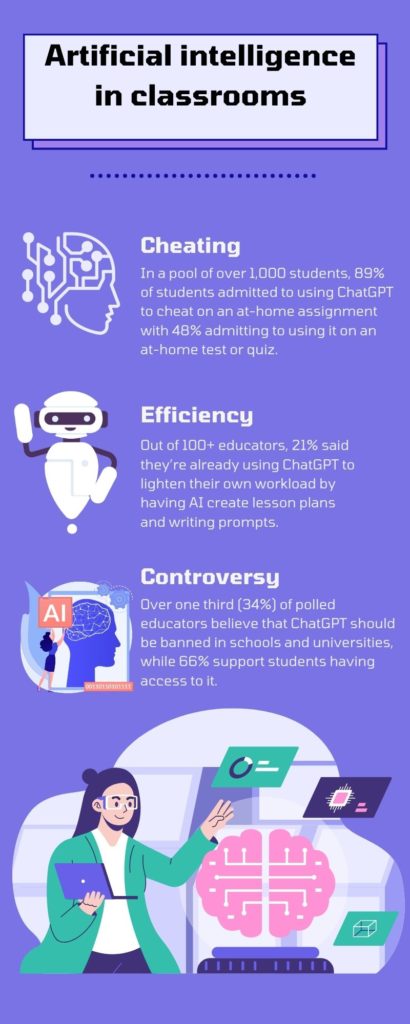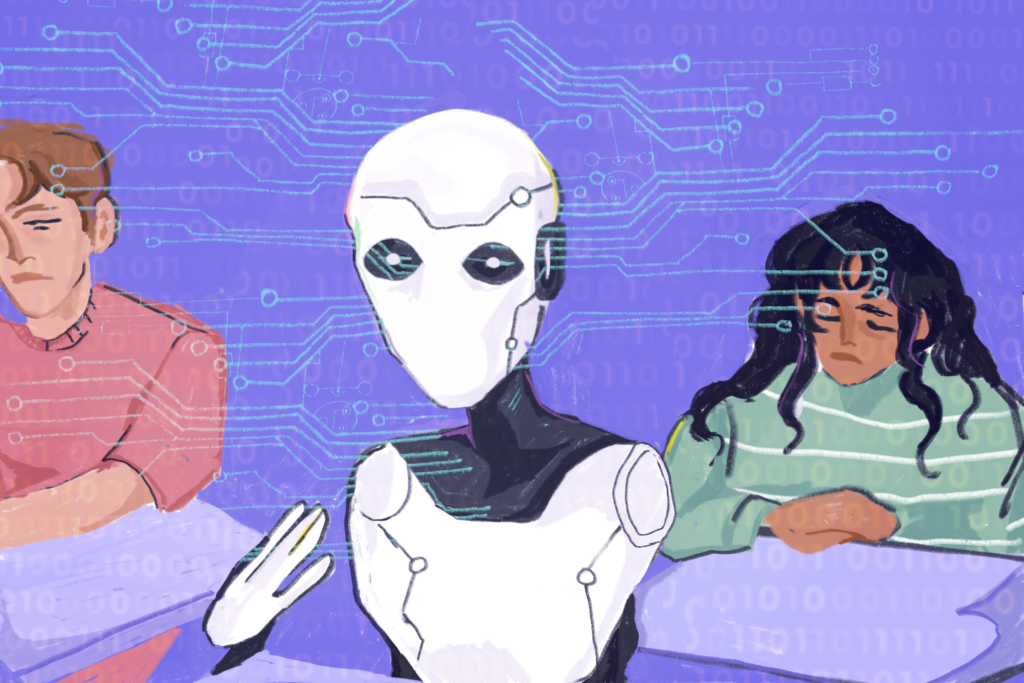Artificial education? The implications of AI chatbots in classrooms
Released in November 2022, popular artificial intelligence chatbot “ChatGPT” sparked both concern and excitement toward the potential impact it would have on classrooms. ChatGPT’s quick rise to fame in mainstream and social media set off a chain reaction leading to a wave of new AI chatbots all hoping to steal the limelight for themselves.
ChatGPT quickly aroused concern about this new and unparalleled method for students to cheat in their classes. Capable of producing short, fair quality essays and responses in a matter of seconds, ChatGPT makes light work of many classroom assignments.
Unlike traditional methods of cheating, ChatGPT and AI-generated text are hard to detect without help from special detection software like “AI Text Classifier,” which was designed by ChatGPT’s parent company OpenAI. AI Text Classifier works by analyzing the provided body of text and reports the likelihood that the text is AI generated. Even with tools like this available it can still be difficult to detect as AI Text Classifier doesn’t have a 100% success rate in detecting ChatGPT composition. If software designed for the sole purpose of preventing the use of AI chatbots to cheat can’t detect AI constructed responses, then what chance do teachers stand?
“What I do is analyze the sentence structure and pattern. Robots are following algorithms so they write perfectly. Humans don’t write perfectly, they’ll carry their sentence structure, they’ll have errors here or there. As we’re coming through our consciousness it’s not perfect, it’s messy,” multicultural literature teacher Brittany Blumenstock said.
AI writing and communication first became possible in the mid 1960’s with the first notable chatbot, “Eliza.” Eliza could take on the role of various professionals like doctors or therapists. Eliza’s downfall was that it was limited to prewritten scripted responses. What sets ChatGPT and its many peers apart from Eliza and other older chatbots is the ease of use and accessibility. In order to access ChatGPT, all users are required to do is to enter a valid email address and phone number— a low bar for entry to one of the most advanced artificial intelligence programs the world has ever seen.
Being familiar with the programs herself, Blumenstock is using AI detection programs in an attempt to counteract AI-based plagiarism and cheating.
“Plagiarism has already been rampant, and this is just another way students will plagiarize. The concern is that it’s much harder to detect. They have plagiarism detectors like GPTzero and originality.ai, but definitive proof is hard,” Blumenstock said.
Brandt Hacker, math department, agrees that AI chatbots are just a new form of cheating which stems from a bigger fundamental problem.
“The whole incentive structure in school has been hijacked. The Zell Miller scholarship for instance is dangling this carrot in front of people. What you think you’ve done is incentivize learning, but what you’ve actually done is incentivize GPA. In theory, those two things should be one of the same, but they’re really not. You (students) can choose to take some classes that are more challenging, while knowing it’s going to potentially hurt your GPA and there’s people who run from those classes. We’ve incentivized people not challenging themselves,” Hacker said.
While Blumenstock can not definitively prove that any of her students are using AI software to cheat, there has been one instance that she is confident a student used ChatGPT.
“The first project we did was a poem, and this student’s poem felt very perfect. It was excellent, and I was like ‘this is too perfect, too balanced, this rhythm is matching this rhythm’ and so on. It (AI detection software) didn’t detect that, so I dont think it’s good at detecting poetry,” Blumenstock said.

Aside from its hard-to-detect responses, ChatGPT poses a complicated obstacle to educators. In section 3A of the ChatGPT terms of use, OpenAI states “you own all Input. Subject to your compliance with these Terms, OpenAI hereby assigns to you all its right, title and interest in and to Output.” In short, this means that the responses generated by ChatGPT belong to the student or user who prompted them.
“That’s a bigger question: who owns the rights to their own work that they create? The policies of ChatGPT, OpenAI state “you own all Input. Subject to your compliance with these Terms, OpenAI hereby assigns to you all its right, title and interest in and to Output.” that they give the rights to what is written to the user. The big question is, are these ideas your own or not?” Blumenstock said.
The World Intellectual Property Organization describes copyright as an intellectual property right law. Intellectual property refers to a creation from the mind of the person claiming IP rights. Students or users technically own the responses they prompt from ChatGPT, but it is highly unlikely that an ownership claim would hold up in a challenge against a teacher.
Even if a student manages to cheat their way through the year using AI chatbots there’s still one obstacle: finals and AP Exams. There’s a very real possibility that students will get to the end of the school year and perform poorly on their finals and AP exams because they don’t actually understand the content.
“I think you should sit for that test and you should fail it because you don’t know the content. You know how to work with ChatGPT, which could be useful, but it’s not the class you’re taking,” Hacker said.
Although he has his gripes, Hacker says there are upsides to the use of artificial intelligence.
“You can speed things up. If you have a solid foundation and a solid understanding then, doing things faster and more efficiently is great. But if you just jump straight to faster and more efficient, there’s something lost,” Hacker said. “I do think that we give people a calculator, or we give people Desmos or we give people a laptop, and then we pat ourselves on the back because they got the answers. It sets them up for disaster because then instead of solving some equation on the board, they get lost in trying to understand it.”
Speeding things up is exactly what Blumenstock uses ChatGPT for herself.
“It can write a lesson plan where students develop their own Socratic questions for the novel and it gives you the objective, materials, lesson duration and lesson procedures,” Blumenstock said.
The still-evolving uses and success of ChatGPT and other AI bots also pose an important question: if this technology has progressed so far, what purpose do human teachers serve?
“There is a fear that this is doing the work for you and that I’m effectively going to replace myself, that I’m making myself unnecessary. However, this is a template. So many of us are already building on the experience of others. ChatGPT has been fed everything that I’m going through in my stack of books and reading for myself. But what I have is knowledge of my students and this specific classroom, so I can take this template and revise it so that it can be applied to my students,” Blumenstock said.
To Hacker’s point, at least one Cedar Shoals student who insisted on remaining anonymous admitted to using ChatGPT to complete various assignments, including work for AP classes. To what degree is he cheating, and to what degree is he just working more efficiently?
“I mainly use it to save time because I don’t want to spend a lot of time doing assignments. If the assignments are very important I make sure to put my own effort into it, but if it’s something that doesn’t really matter and I just want to get done really quick then I just use it,” the student said.
AI chatbots don’t just help students cheat. Rather they also pose a threat to students who aren’t cheating.
“I’ve never been caught, but I have been accused of cheating on an assignment that I did myself. I didn’t use AI for it. The teacher knew that I was good at using ChatGPT so they assumed that I used it on the assignment,” the student said.
In the case of this particular student, they do not using ChatGPT don’t immediately turn to ChatGPT for their assignments.
“Obviously, I try to do the assignment myself. If I can’t, then I try to look up answers to see if there’s a solution that I can find. If not, that’s when I go to ChatGPT. It just depends on how I use it. I use it as a last resort. I don’t try to use it on everything because it’s really easy to figure out whether something’s written by AI, so I try to limit myself,” the student said.
Artificial intelligence poses complex situations to students and teachers alike. How do you approach cheating? How can it benefit you?
“At first I just kind of saw it as a thing to ask dumb questions, but now I kind of see it as an alternative to like looking stuff up on the internet and trying to find sources,” the student said.




